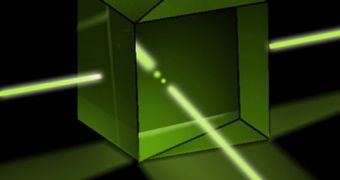Scientists with the Massachusetts Institute of Technology (MIT) recently proposed a new experiment that could prove quantum computers can indeed be built, and handle operations that are out of reach for even the most modern computers today.
This particular experiment would be tremendously complex and difficult to set up, but the team says that it would still be simpler to conduct than it is to construct an actual quantum computer.
These special machines are heavily investigated today, because they hold the promise to be several times faster than today's supercomputers. They theoretically work by harnessing the two basic effects of quantum mechanics – superposition and entanglement.
When average computers try to simulate something complex, such as how atoms interact in a substance, or the movement of people on a street, they quickly reach intractable calculations, or need years of non-stop processing.
Quantum computers could handle such calculations a lot faster, and would therefore help advance science considerably. This is why teams around the world are struggling to build one.
The new experiment proposed at MIT would still use quantum effects to perform otherwise intractable calculations, but would represent only a stepping stone to building an actual quantum computer.
MIT associate professor of computer science Scott Aaronson and graduate student Alex Arkhipov are currently working on detailing the experiment, which will be officially unveiled this June, at the 43rd Symposium on Theory of Computing organized by the Association for Computing Machinery.
If their attempt succeeds, then they will manage to demonstrate conclusively that quantum computers are indeed better than classical ones, and that they can harness the power of quantum effects.
The prototypes in existence today are capable of performing only basic operations, and so their creators are having a hard time in determining whether they actually harness these effects.
This experiment “has the potential to take us past what I would like to call the 'quantum singularity,' where we do the first thing quantumly that we can’t do on a classical computer,” says Terry Rudolph.
The expert, who is not a part of the research, holds an appointment as an advanced research fellow with the Imperial College London (ICL) Quantum Optics and Laser Science division.
“It’s challenging, technologically, but not forbiddingly so,” says of the experiment the director of the University of Calgary Institute for Quantum Information Science, Barry Sanders.

 14 DAY TRIAL //
14 DAY TRIAL //